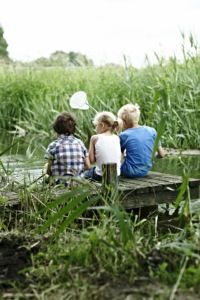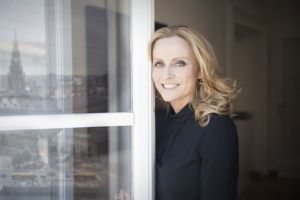Opinion
The Road Less Taken: Embracing the Danish way of parenting
Jessica Alexander
This article is more than 3 years old.

“Pssst. You used to whittle with knives, right? A fish should be no problem” (photo: Visit Denmark/Niclas Jessen)
When I married a Dane over 20 years ago and came to Denmark for the first time, I was a self-proclaimed ‘non-maternal person’. I didn’t even know if I wanted to have children.
What I would learn from this tiny country in the north of Europe – famous for The Little Mermaid, Nordic Noir and Hans Christian Andersen among other things – would blow me away.
In a faraway land
I wasn’t blown away by the wind, which in fairness was very gusty. I wasn’t blown away by the food or the taxes or the weather. No, it was the children who astonished me.
I would find myself endlessly observing peaceful parents and calm, serene kids who seemed truly happy, respectful and well-behaved. How was this possible without screaming, yelling and ultimatums, I wondered? What was going on with all of this free play, hygge and empathic communication?
Could learning to whittle with knives at the age of three, rather than forcing academia, be the secret to the edge Americans so desperately wanted for their children?
From duckling into swan
This kind of question would set me on a journey that would change my perspective so profoundly, it became my life’s work to research and write about the Danish educational model.
Denmark has been voted one of the happiest countries in the world for over 40 years in a row, and I firmly believe it’s because of the way they raise their children.
I converted myself from my American way of parenting to the Danish way many years ago, and it was the biggest transformation I’d ever experienced. I went from being a ‘non kid person’ to a thriving parent and happier human being.
The princess and my prose!
So, when I read last week that Kate Middleton, aka the Duchess of Cambridge, had read ‘The Danish Way of Parenting; what the happiest people in the world know about raising confident capable kids’, a book I co-authored with a Danish psychotherapist, I was flabbergasted.
The British newspaper The Telegraph reported: “The Duchess, who has read the book as part of her own parenting journey” visited Denmark to study the early parenting and educational system in Denmark to share this model with the UK.
The book aims to help parents around the world take a look at their own culture, and then take a look at the Danish culture, and ask if there might be a better way of doing things. The premise is that happy kids grow up to be happy parents who repeat the cycle.
Happy forever after
Coming from America, a culture where competition and individuality make up the bedrock of what it means to be successful, we consistently score low on the happiness scales. If we want to get ahead in wellbeing, we might want to reconsider these core values.
Perhaps if the UK gets on board with The Danish Way, other countries will be open to it too. Soon, we may all discover that the survival of the fittest was always the fairy-tale and that the survival of the friendliest was the real story of happily-ever-after.

About
Jessica Alexander
Jessica is a bestselling US author, Danish parenting expert, columnist, speaker and cultural researcher. Her work has been featured in TIME, The Huffington Post, The Atlantic and The NY Times, among others. She graduated with a BS in psychology and speaks four languages. Follow Jessica on IG @jessicajoelle_ or jessicajoellealexander.com.










































